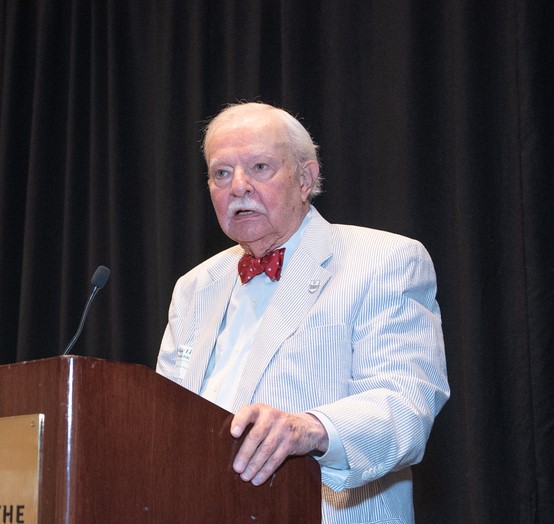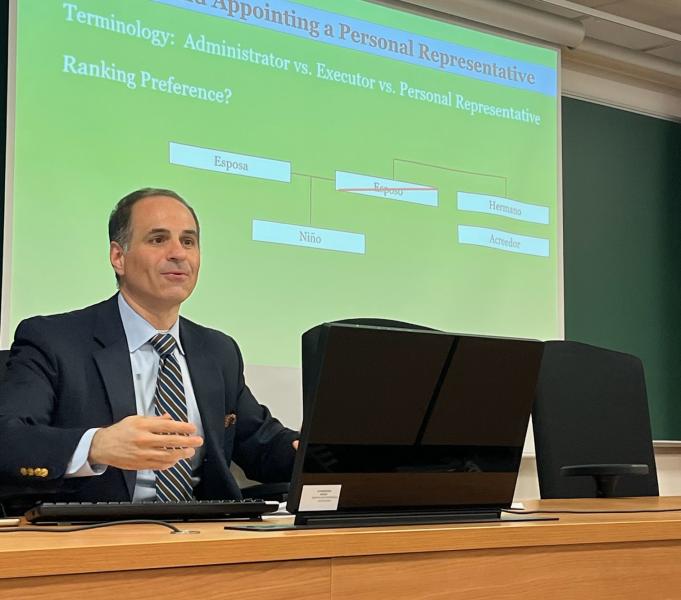Home / Tulane Law alumni behind the beginning and future of Louisiana trust law
Tulane Law alumni behind the beginning and future of Louisiana trust law
November 28, 2023 2:15 PM

Without Tulane Law School, Louisiana trust law would not exist.
While the idea of enforceable charitable donations was recognized under Roman law, the trust – a legal device whereby ownership of property is bifurcated between a trustee who holds legal title and a beneficiary who holds equitable ownership – was completely foreign to the civil law and, thus, Louisiana law. But thanks to a legion of Tulane lawyers, trust law eventually made its way to Louisiana.
“Tulane professors and alumni are unquestionably the reason that trusts exist in Louisiana today,” said Interim Dean Sally Richardson, herself an expert in Louisiana property law. “The history of trust law and Tulane runs deep and Tulane’s substantial influence on trust law in Louisiana continues even now.”
The first comprehensive legislation on private trusts in Louisiana was enacted in 1938 and was largely drafted by Tulane alumni John Minor Wisdom (L’29) while he was in private practice before being appointed to the U.S. Fifth Circuit Court of Appeals. In 1959, the Louisiana State Law Institute (LSLI) created an Advisory Committee to study and revise Louisiana trust law, appointing Tulane Law Professor and alum Leonard Oppenheim (L’39, LLM’41) as the Reporter of the Committee with numerous Tulane alumni serving on the Committee including Paul O.H. Pigman (A&S’43, L’47) and Ledoux R. Provsoty (L’1920). The Louisiana legislature adopted the proposal from the work of the Committee in 1964 and ever since then, Tulane-educated lawyers have remained important in revising and updating Louisiana trust law and the related law of successions.

Louisiana trust law.
“From John Minor Wisdom to Leonard Oppenheim to Tommy Lemann to "Pappy" Little to Max Nathan to Ted Martin and Cindy Samuel, Tulane lawyers have been at the forefront of Louisiana successions and trust law,” said John Minor Wisdom Professor of Civil Law Ronald J. Scalise Jr. (TC’97, L’00). “Tulane has had an indelible impact on trust law in this state.”
In 1962, Thomas Lemann (L'53) joined the Trust Code Committee of the LSLI as the Secretary. The Hon. F.A. “Pappy” Little Jr. (A&S’58, L’61) – who studied successions under Oppenheim at Tulane Law School – took over as the Committee’s Chair in 1987. Judge Little was a natural fit for the Committee Chair position as he was a long-time leader in the world of trusts and estates in Louisiana. In 1976, Judge Little was elected to the American College of Trusts and Estate Counsel (ACTEC), the most prestigious trust law organization in the United States. To date, Judge Little is the longest-serving Louisiana member of ACTEC.
“After I graduated from Tulane, I began working at Chaffe, McCall, Phillips, Burke, Toler, and Hopkins in New Orleans and started doing a little successions work and decided that was the type of legal practice I wanted to have,” Little said in reflecting on his long career in the area of trust law. “If you did estate planning, successions, wills and estates, then trust law was a natural area in which to work. Trusts had only become a vehicle for Louisiana estate planners to use in 1938, so it was a really interesting time to be working in the area.”
In 1987, Ted Martin (L '67) became the Reporter for the Trust Code Committee and then stepped into the role of Chair in 1991 when Tulane Law Professor and alumna Cynthia Samuel (L’72) took over as the Reporter. Both Martin and Samuel, like Judge Little, are elected members of ACTEC.
In 2012, Scalise followed in the footsteps of so many Tulane Law predecessors and became the Committee’s Reporter, a role he maintains today. Scalise also serves as the Reporter for the LSLI’s Successions Committee. And, like many other Tulanians who specialize in trust law, Scalise is an elected member of ACTEC.

and estates.
David Edwards (A&S’71, L’72), a member of the Louisiana Successions Committee and an elected member of ACTEC, noted how fitting it was to have Scalise as the Reporter of the Trust Code and Successions Committees.
“Ron is a terrific Reporter for the Louisiana Trust Code and Successions Committees; he really is the perfect person for the position. He is able to focus the Committees and help us produce updates to our Trust Code and succession law that better serve the people of Louisiana," said Edwards. "It makes me so proud to be an alum of Tulane when I think about all of the great Tulanians who have worked on Louisiana law through the years and had a deep impact on my practice.”
Professor Scalise had great gratitude in reflecting on the individuals who have impacted his own knowlege of trust law and successions law.
"There are so many people who have taught me throughout my professional career and helped me gain insights to Louisiana trust and succession law," said Professor Scalise. "Cindy Samuel taught me successions and trusts in law school and has remained a mentor and friend. Being able to step into her shoes on the Trust Code Committee is deeply meaningful for me. But there are so many other Tulane lawyers who have mentored me along the way -- Tommy Lemann, Pappy Little, Max Nathan, Ted Martin, David Edwards, Ken Weiss, Carole Neff... the list goes on and on. Tulane Law School should be proud of all the work its alums are doing in the area of trust law in Louisiana."
Carole Cukell Neff (L’77), a partner at Sessions, Fishman & Nathan, expressed similar gratitude for the individuals who came before her.
“When I started practicing in the late 1970s, Max Nathan really took me under his wing and taught me the ins and outs of having an estate planning practice. He got me to teach a paralegal course on wills and trusts which forced me to really understand the law so that I could explain it to others. And I found that I really loved everything about estate planning. There is a lot of satisfaction in helping people plan so that when they pass away, everything can be smoother and less expensive for their families. It is a very rewarding practice," said Neff, who is also an elected member of ACTEC and was the first woman and the youngest person from Louisiana to be elected to the organization.
Judge Little concurs with Neff on why trusts are so important for Louisiana law.
“The trust is a vehicle that makes things a little smoother when you are trying to leave your estate to your loved ones. You do not want to die intestate but instead want to be able to direct where your property goes within the confines of the law. Trusts are a very helpful tool in achieving that goal,” said Judge Little.
Given that Tulane lawyers throughout history have been instrumental in developing Louisiana trust law, it is no wonder that recent graduates continue to flock to the study and practice of trust law.
“Studying successions at Tulane made me excited about working in the area of trust law. I was drawn to this field because as I learned at Tulane, practicing in the area of trust law presents an opportunity to work with clients to enact plans that give them peace of mind that their wishes will be carried out and to assist clients with their goals of wealth preservation and family business continuity for future generations,” said Katelyn Gunn (L’15) who works as Special Counsel at Stone Pigman.
Hobie Hotard (L’20), an Associate at Jones Walker, agrees with Gunn’s assessment of why trust law is such an interesting area of practice.
“Counseling clients on estate and gift tax reduction and preparing wills, trusts, powers of attorney, marital property agreements, and more gives me the ability to help real people and families develop an estate plan and a business succession plan," said Hotard. "Navigating the complex issues of how individuals and foundations can grow and preserve wealth while establishing and administering charitable giving plans is a fascinating area to work in and one that is always developing in the law. Studying trust law at Tulane with professors who are literally writing Louisiana trust law has given me a real advantage in my practice."
“Like many estate planners, I did not expect to be drawn to estate planning when I came to law school. I came to Tulane to do maritime law,” said Joe Trytten (SLA’17, L’19). “But as I took more courses about tax law, property law, and trusts and estates, I gravitated more and more to that field. It’s important, satisfying work, and the estate planning bar is a very congenial group of lawyers. I enjoy how the law is always changing, and there are always new things to learn," he said. "But one thing has not changed throughout my career: my continued reliance on Tulane Law’s faculty for inspiration and expertise in the ever-changing areas of trusts and estates.”
Trytten has since received his LLM in Tax Law at Northwestern University's Pritzker School of Law, and now practices estate planning in Chicago.
Reflecting on the student interest in trust law, Richardson noted the deep roots of civil and comparative law at Tulane Law School.
“Comparative law and civil law are part and parcel to Tulane Law School, and they are fundamental to Louisiana trust law. From the founding of Tulane Law in 1847, we have recognized the importance of the study of comparative law. If you look back at the origins of trust law in Louisiana going back to the days of Judge John Minor Wisdom, you find a rich comparative legal history in the area that continues today.”
Tulane Law’s strength in training trust and estate lawyers makes it unsurprising that Tulane’s Estate Planning Institute is also a bedrock of the institution. In November 2023, the Tulane Estate Planning Institute held its 32nd annual conference with more than 125 area estate planners in attendance.
“Every year we are able to bring in the best and brightest lawyers in the area of Louisiana trust law and help continue education in the field,” said Professor Scalise, who runs the Tulane Estate Planning Institute. “It’s a great opportunity to highlight the unmatchable talent Tulane Law produces in the area of trusts and estates.”